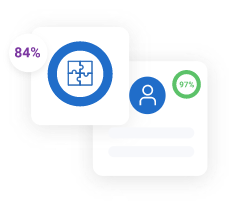- Application
- Information
Apply through Brive
We are official partners! Complete your application for free and earn benefits!
Free review on your application |
1:1 counselling by certified consultants |
Higher acceptance rate on your top choices |
Duration
2 Years
Language
English
Available Scholarships
Vilnius University offers scholarship options for this program. Apply through Brive.
Schedule a free callProgram Description
This Master in English Studies (Linguistics) provides students with an in-depth foundation in the contemporary trends of linguistics and cross-linguistic research methods. The focus is on training autonomous linguists, who are capable of creatively addressing language use-related issues and are able to use the acquired linguistic competences in their research and/or teaching career at educational and/or research institutions.
Entry Requirements

Are you eligible to apply?
Sign up, check the entry requirements, and find out your compatibility with the program.
Why choose this program?
- The program emphasises the real-world application of strategy through interactive lectures, challenging case studies, immersive business simulations, and real-life consultancy projects. It prepares students to make informed decisions that optimise outputs and achieve desired profitability.
- Studying under our faculty will give you rigorous analytical thinking skills, a deep understanding of economic frameworks, and solid quantitative capabilities, which are crucial in today’s data-driven business environment.
- Interdisciplinary approach: integrating economics with strategic management, offering a broad perspective on both disciplines.
- Dedicated faculty: learn from dedicated program team members and professionals.
- Engagement opportunities: participate in societies, career clubs, and university-level representation.
More
Learning Outcomes
- Analyse, synthesise and critically evaluate the trends in contemporary linguistics, linguistic theories and various approaches.
- Solve theoretical and practical issues critically and logically, generate ideas, predict problem-solving strategies and suggest new solutions to problems, as well as efficiently communicate and cooperate when working individually or in a team.
- Be proficient in the use of English.
- Apply linguistic research methods and approaches while analysing and critically evaluating linguistic phenomena and solving (English) language-related issues.
- Analyse the changes in language in various spheres of public communication.
- Evaluate the adequacy of language use in a professional environment.
- Apply their independent research skills to: study literature, analyse and synthesise theoretical frameworks, collect and classify empirical data, and conduct medium and large-scale research projects.
- Apply digital information technologies in their research (data collection and analysis).
- Apply their acquired knowledge and skills in their future professional career or in further research activities.
More
Curriculum
Jobs - Careers
- Editing
- Translation
- Lexicographic Practice
- Proofreading
- Publishing
More
Fresh Content
The content has been updated in the last 6 months
Need help applying to this program?
Schedule a free 20-minute counseling session today!